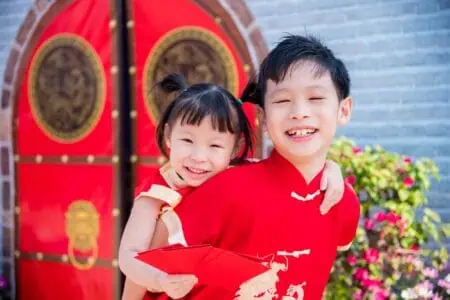Chinese last names are some of the most intriguing. With their lilting pronunciations, these surnames have captivated hearers for centuries. Are you curious about Chinese family names? If so, you’ll be enamored with this extensive roundup of Chinese surnames.
We’ve included meanings, origins, pronunciations, and even a few fun namesakes. You’ll walk away with a newfound knowledge or insight into your family history. Grab a drink and kick back. A grand buffet of Chinese last names awaits you!
100 Popular Chinese Last Names
These famous Chinese last names will infuse your life with culture and beauty.
Bai
Bai is featured in the classic Chinese Hundred Family Surnames poem, where it ranks 37th. Bai was initially given to families with pale skin, a once desirable trait in Asia. Many believe Bai was a reputable “B” surname inspired by Emperor Yan. Bai is also a fairly popular forename, borne by Chinese singer Bai An.
- Origin: Chinese
- Meaning: White
- Pronunciation: BYE
- Popularity: Bai is among the top 100 Chinese surnames.
Cai
Cai is among the most versatile Chinese last names, appearing in many forms. Alternate meanings include “from Cai” and “ancient ritual.” Cai is most famous in its continent of origin, particularly Taiwan. In America, you’re likelier to see Cai as a forename for boys.
- Origin: Mandarin
- Meaning: The tortoise used in divination ceremonies
- Pronunciation: KYE, CHOY
- Variations: Kai, Tsai, Choi
Cao
Cao originated as a formal title for a government member. Honorable namesakes include Cao Teng, the only eunuch to become an emperor. Alternate meanings include “grasp” and “grass.” Like many Chinese surnames, Cao can also be written with a T.
- Origin: Chinese
- Meaning: Government department
- Pronunciation: CHOW, SOW
- Popularity: Cao is popular in Asia but rare elsewhere.
Chen
Chen is among the most famous surnames in Taiwan, Singapore, and Hong Kong. Although it is most prevalent in China, it’s well-known worldwide. Chen is mentioned in shows like The Rookie and Grey’s Anatomy. Alternate meanings include “morning,” “ancient,” and “east.”
- Origin: Mandarin
- Meaning: Dawn
- Pronunciation: CHUIN
- Namesakes: Joan Chen, an American Chinese actress known for her role in Twin Peaks.
Cheng
Cheng may be a popular surname that starts with C, but it’s also a rising forename in Asia. Cheng was initially given to those who mastered great things, making it ideal for A-list clans. Notable namesakes include Singaporean actress Amy Chen, known for her role in Crazy Rich Asians.
- Origin: Chinese
- Meaning: Accomplish, succeed
- Pronunciation: CHUNG
- Variations: Tseng
- Namesakes: Francois Cheng, a Chinese French poet and author.
- Popularity: Cheng is among the top 50 surnames in China.
Cho
Cho is among the most multifaceted surnames on the list. Cho was given to sweet-tempered clans but also to second-born children. Cho can also mean “beginning” and “outstanding,” representing the brilliance of new adventures. Cho is mentioned in the Harry Potter series as Harry’s love interest.
- Origin: Chinese, Korean
- Meaning: Sweet, candle
- Pronunciation: CHOH, KOH
- Namesakes: Erica Cho, an American artist and filmmaker.
Cui
Cui is among China’s top 100 surnames, though you’ll find it in Korea, too. Rare instances of Cui appearing outside Asia do happen, for example, Russian composer Cesar Cui. Cui is an uncommon derivative of Jiang that originated with the Qing dynasty. Alternate meanings include “mountaintop” and “peak.”
- Origin: Mandarin, Korean
- Meaning: Lofty
- Pronunciation: SOY, TSWEE
- Variations: Tsui
- Namesakes: Elizabeth Cui, a New Zealand diver who placed at the World Championships.
- Popularity: Cui is famous in Korea and China but rare elsewhere.
Dai
Dai is a title that commands respect, but it was also an occupational “D” surname for those who applied ointment. Dai is among the top 100 surnames in China, but you’ll find it spread throughout Asia. Alternate meanings include “to wear,” ideal for fashion-forward families. Notable namesakes are abundant, such as Leon Dai, a Tawainese film director and actor.
- Origin: Chinese
- Meaning: Respect, support
- Pronunciation: DYE, TYE
- Variations: Tai
- Namesakes: Aaron Dai, an American composer and pianist.
Deng
Deng joins the ranks of topographical Chinese family names given to those from a small province. Deng is also a Sudanese option meaning “rain” and the title of a powerful Sudanese god. Other prominent namesakes include Deng Chao, a Chinese actor, comedian, and singer.
- Origin: Chinese
- Meaning: From Deng
- Pronunciation: DENG
- Namesakes: Si-an Deng, a Chinese badminton player.
- Popularity: Deng is among the top 25 surnames in China but is rare elsewhere.
Ding
Ding is a Mandarin and Cantonese option for adult men or a population. Ding originated with the Shang dynasty, with a prominent leader, the Duke of Ding. Like many Asian surnames, Ding is also a common forename. You’ll find Ding mentioned in Korean television shows like The Bund.
- Origin: Chinese
- Meaning: Male adult
- Pronunciation: DHING
- Popularity: Ding is famous in China but rare elsewhere.
Dong
Dong was initially given to supervisors or managers. It’s rumored that Dong originated with Dong Fu, a supervisor of noble blood. Like many surnames, Dong was originally a forename given in honor of royals. Notable namesakes include Joanna Dong, a Singaporean songwriter and singer.
- Origin: Chinese, Cantonese
- Meaning: To manage
- Pronunciation: DHOHNG
- Namesakes: Dong Dong, a Chinese Olympic gymnast.
Du
Du is an occupational surname for winemakers or a habitational surname for families dwelling near pear trees. Du is among the shortest Chinese last names, but it packs a punch. Alternate meanings include “to stop” and “to restrict.” Du may be brief, but it’s considered one of the most popular surnames in China and Taiwan.
- Origin: Chinese
- Meaning: Birchleaf pear
- Pronunciation: DOO, TOO
- Variations: Tu
- Namesakes: Jumping Du, a Chinese computer scientist.
- Popularity: Du is famous in China but rare elsewhere.
Duan
In Chinese, Duan refers to a length of time, passage of a book, or section of thread. Duan is the ideal surname for families who make the most of their time. Duan is found primarily in Asia, but it’s likelier to be used as a forename.
- Origin: Chinese, Korean, Vietnamese
- Meaning: Paragraph, section
- Pronunciation: DWAHN, DWAN
- Popularity: Duan is well-known in Asia but rare elsewhere.
Duong
Duong is a Vietnamese term for endearment, ideal for sweet-natured families. In Chinese, Duong is a variation of Yang, meaning “feed.” Dương (pronounced ZWUNG or YWUNG) is also a prominent Vietnamese unisex name, meaning “male, virile” or “willow.”
- Origin: Chinese, Vietnamese
- Meaning: Dear one
- Pronunciation: DWAHNG, DOO-wahng
- Variations: Dzuong
- Namesakes: Porter Duong, an American actress known for her role in This Is Us.
Fan
Fan is a cool option that can be habitational or topographical. Fan referred to families dwelling near a particular fief (state of land) or fence hedges. In ancient China, the Fan family originated from Emperor Yao and was connected to the Yellow Emperor.
- Origin: Mandarin, Cantonese
- Meaning: Mold, restrict
- Pronunciation: FAHN, FAHM
- Variations: Pham
- Namesakes: Mavis Fan, a Taiwanese singer and actress.
- Popularity: Fan is among the top 50 surnames in China.
Fang
Fang may bring visions of fierce animals to mind, but it was initially considered tame. In the past, Fang was given to those with “square” personalities or serious temperaments. Notable namesakes include Ian Fang, a Chinese actor, rapper, and songwriter. Alternate meanings include “room” and “space,” representing the joy of homemaking.
- Origin: Mandarin
- Meaning: Four-sided
- Pronunciation: FANG, FAHNG
- Variations: Pung
- Namesakes: Thomé H. Fang, a Chinese philosopher.
Feng
Feng referenced the wild motion of a horse and was often given to stablehands. Feng originated in the Zheng era, where occupational surnames were popular. Unsurprisingly, Feng has endless namesakes, including Joyce Feng, a former Chinese Minister without Portfolio of the Executive Yuan.
- Origin: Mandarin
- Meaning: Wade, gallop
- Pronunciation: FENG
- Namesakes: Maggie Feng, an American professional chess player.
- Popularity: Feng is among the top 40 Chinese surnames.
Fu
Fu was initially adopted by descendants of Shang Prime Minister Fu Yue. Fu can also point to the Zhou dynasty, a time of agricultural change. Alternate meanings include “master,” though the title was also given to military generals. Fu may be among the shortest surnames, but it’s not your stereotypical option.
- Origin: Mandarin, Cantonese
- Meaning: Tally
- Pronunciation: FOO
- Variations: Foo
Gao
Gao was given to those of high stature or social standing. What a fitting option for tall families. Gao was first recorded during the Song dynasty when a relative of Prince Gao carried on the name. Gao is well-known in China, but you’ll also find it in Korea and Taiwan.
- Origin: Mandarin
- Meaning: High
- Pronunciation: KOW
- Variations: Kao
- Namesakes: Alice Gao, a Chinese musician and DJ.
- Popularity: Gao is popular in China but rare elsewhere.
Gong
Gong points to bowing to elders and guests, a foreign sign of respect. Gong can also refer to a type of bell used during religious ceremonies. Other meanings include “royal palace” and “to consolidate.” Gong is also a unique East Asian forename, borne by Gong Xian, a painter from the Ming dynasty.
- Origin: Mandarin
- Meaning: Bow
- Pronunciation: GAHNG, KHUNG
- Variations: Jiang
Gu
Gu is among the top 100 Chinese last names, but you’ll also find it in Korea. Gu joins the ranks of occupational picks, as it refers to doctors or animal caretakers. Alternate meanings include “ancient,” “old,” and “old Duke,” making this short title a royal flush.
- Origin: Chinese, Korean
- Meaning: To care for
- Pronunciation: KOO, GOO
- Variations: Ku, Koo
- Popularity: Gu is most prevalent in China and is rare elsewhere.
Han
Han is one of Korea’s oldest surnames, although it’s spread throughout Asia. Han doubles as a prominent forename, belonging to many athletes, singers, and actors. Hearers are bound to associate Han with the Star Wars character Han Solo. Alternate meanings include “Korean people” and “kingdom.”
- Origin: Mandarin, Korean
- Meaning: King, country
- Pronunciation: HAN, HAHN
- Variations: Hahn, Haan
Hao
Hao is a nature-inspired option referring to the vastness of the universe. Alternate meanings include “open-minded” and “straightforward,” ideal for blunt yet fair families. Hao is also a prominent forename borne by stars like Chinese singer and actress Hao Lei.
- Origin: Chinese, Mandarin
- Meaning: Vastness
- Pronunciation: HOW
- Namesakes: Andrew Hao, former Roman Catholic bishop of Xiwanzi, China.
- Popularity: Hao is among the top 100 Chinese surnames.
He
He is among the top 20 beautiful Chinese family names. He is also popular in Korea, often appearing as Ha. Alternate meanings include “what” and “celebrate,” which are ideal for families who love a good time. You’ll also find He is a standard unisex forename borne by Chinese computer scientist He Jifeng.
- Origin: Chinese
- Meaning: Ask, congratulate
- Pronunciation: HE, HAY, HER
- Variations: Ho
- Namesakes: Sui He, a Chinese fashion model.
Helen
Helen is a multifaceted option that can also mean “extra large” and “ethics.” Helen is a rare last name worldwide, even in its country of origin. Those with this surname will spend plenty of time correcting others’ pronunciation. When written, Helen will undoubtedly remind viewers of Helen of Troy, a mythical figure hailed for her beauty.
- Origin: Chinese, French
- Meaning: Sea, lake
- Pronunciation: HYE-luhn
- Popularity: Helen is a popular forename but a rare surname.
Hou
Hou joins the ranks of occupational Chinese last names, pointing to a marquis. Hou can also point to other members of nobility or royalty, such as a queen or empress. Alternate meanings include “suddenly” and “afterward.” You’ll find Hou mentioned in the hit video game series Mr. Driller.
- Origin: Mandarin, Cantonese
- Meaning: Marquis
- Pronunciation: HOH
- Variations: Hau
- Namesakes: Susanne Hou, a Chinese violinist.
- Popularity: Hou is popular in China but rare elsewhere.
Hu
Hu is a topographical option referring to families dwelling near fields of butterflies. Hu also described families with fierce personalities hailing from the north. Alternate meanings include “dagger axe” and “wattle.”
- Origin: Chinese, Mandarin
- Meaning: Dewlap, how
- Pronunciation: HOO, WOO
- Namesakes: Chih-Wei Hu, a Major League Baseball pitcher.
Huang
Huang refers to those dwelling near the Yellow River, known for its size. Huang can also mean “jade,” pointing to a gemstone many viewed as sacred. Huang has been a top 10 surname in China for centuries and a top 7 pick in Vietnam.
- Origin: Mandarin
- Meaning: Yellow
- Pronunciation: WANG
- Variations: Hoang
- Popularity: Huang is the 7th most popular Chinese family name.
Jia
Jia is an occupational option referring to merchants or market leaders who set prices. Jia could also describe those hailing from Jia or under a ruler named Jia. Notable namesakes include Jia, a former King of Wei who ruled in the 200s.
- Origin: Chinese
- Meaning: Price
- Pronunciation: TEE-ah, CHEE-ah
- Namesakes: Pan Jia, a Chinese football player.
Jiang
Jiang points to the River Jiang, located in the heart of China. Jiang was also the title of a Chinese state that originated in the Shang dynasty. Alternate meanings include “ginger” and “Yan Emperor.” Notable namesakes include Yujiang, China’s mythical god of water.
- Origin: Mandarin
- Meaning: River
- Pronunciation: CHYAHNG
- Variations: Chiang, Qing
- Popularity: Jiang is among the top 100 Chinese surnames.
Jing
Jing is a popular Asian surname that doubles as a unisex forename. Jing originated in the Zhou dynasty and was inspired by the rulers of Jingzhou. Alternate meanings include “chaste tree,” “classic book,” and “scenery.” Jing is also a moniker for Beijing, the capital of China.
- Origin: Chinese
- Meaning: Peaceful, gentle
- Pronunciation: JING, CHEENG
Ju
Ju is a shortened version of Zhu, which is popular in Korea and China. Alternate meanings include “red” and “around,” ideal for passionate families. Like many Chinese surnames, Ju was originally a state during the Zhou dynasty.
- Origin: Chinese, Korean
- Meaning: Ball made of leather
- Pronunciation: JOO, CHUY
- Variations: Joo
- Popularity: Ju is popular in Asia but rare elsewhere.
Kang
Kang is a variation of Samarkand, an Asian city on the Silk Road. Kang is among the top 100 surnames in China and the 6th most popular Korean family name. Notable namesakes include Kang Shu, the first King of Wey.
- Origin: Chinese, Korean
- Meaning: Healthy
- Pronunciation: KAHNG
Ke
Ke is most popular in Hubei, China, though you’ll find it scattered throughout Asia. Ke was inspired by Ke Lu, a prince who lived in 770 B.C. Notable namesakes include Ke Mengde, a Song dynasty poet.
- Origin: Chinese
- Meaning: Bough, stalk
- Pronunciation: KAH, KAY, KWAH
- Popularity: Ke is among the top 200 Chinese last names.
Kong
Kong will remind hearers of Hong Kong, a bustling city, or King Kong, a villainous ape. Alternate meanings include “hole,” “palace,” and “gifts.” Notable namesakes include Kong Qui, also known as the great philosopher Confucius.
- Origin: Chinese, Korean
- Meaning: Empty, air
- Pronunciation: KAHNG
Lai
Lai is a cute Mandarin option that can also mean “rascal” and “scoundrel.” What a fitting option for rebellious families! Lai’s alternate meanings include “to depend on,” giving this title a responsible air.
- Origin: Chinese
- Meaning: Song, poem
- Pronunciation: LYE, LAH
- Namesakes: Pinky Lai, a Chinese automobile designer.
- Popularity: Lai is popular in Asia but rare elsewhere.
Lang
Lang is among the top 300 Chinese surnames, appearing as the 48th title in the Hundred Family Surnames poem. Lang was initially given to sons but can also be a pet name between couples. Lang originated in the Qing dynasty and doubled as a prominent city’s title.
- Origin: Chinese, Manchu
- Meaning: Son
- Pronunciation: LHANG
- Namesakes: Lang Lang, a Chinese pianist and violinist.
Lao
Lao is an occupational surname referring to general laborers or servants. Alternate meanings include “consoling” and “rewarding,” ideal for families who know the joy of hard work. Lao originated in the Han dynasty and was inspired by Lao Shan, a famous hill.
- Origin: Chinese, Taiwanese
- Meaning: To toil
- Pronunciation: LOW, LOH
Lee
Lee was originally given to families dwelling near plum trees, a symbol of hope. Lee is among the top 20 surnames in America, Hong Kong, Malaysia, and Canada. Alternate meanings include “sharp,” “dark,” and “strict.”
- Origin: Chinese
- Meaning: Plum tree
- Pronunciation: LEEH
- Variations: Li
- Namesakes: Bruce Lee, a Chinese American martial artist, and actor.
- Popularity: Lee is a popular surname in America and Asia.
Lei
Lei speaks of the wonderful ferocity of thunderstorms. What a fitting option for families who make an impact. Lei was inspired by Prince Fang Lei Shi and Doctor Lei Gong, who lived in the 27th-century B.C. The Dutch claim Lei as a moniker for someone with an easygoing personality.
- Origin: Mandarin, Chinese
- Meaning: Thunder
- Pronunciation: LAY
- Variations: Lai
Li
For centuries, Li has skyrocketed until it became one of the top 2 surnames in Hong Kong and China. Li initially referred to families dwelling near plum trees or those who sold plums. Li can also be a derivative of Dali, pointing to artists.
- Origin: Chinese
- Meaning: Plum
- Pronunciation: LEE, LYE
- Variations: Lee
- Popularity: Li is among the top 5 surnames in Asia.
Liang
Liang initially referred to those dwelling near bridges, though it can also mean “to shine brightly.” Liang is among the top 10 surnames in Hong Kong, inspired by a state established in the Zhou dynasty. There’s no better option for families with star potential.
- Origin: Chinese, Mandarin
- Meaning: Roofbeam
- Pronunciation: lee-AHNG
- Variations: Leung
- Namesakes: Edwaard Liang, a Taiwanese American dancer and choreographer.
Ling
Ling has a melodious air, fitting as it can also mean “bell” and “sound of jade.” In ancient Chinese culture, jade was thought to bring good luck and prosperity, making this surname sacred. Alternate meanings include “dawn” and “unbreakable spirit,” ideal for those with resilience.
- Origin: Chinese
- Meaning: Chime
- Pronunciation: LEENG
- Namesakes: Laura Ling, an American journalist who worked for Current TV.
- Popularity: Ling is popular in Asia but rare elsewhere.
Linghu
Linghu originated in the Zhou dynasty and was initially the name of a city. After warrior Wei Ke avenged the city, his relatives took the surname Linghu to honor his legacy. Linghu can also mean “forest lake,” giving this fierce title an air of tranquility.
- Origin: Chinese
- Meaning: City of Linghu
- Pronunciation: ling-HOO
- Variations: Linhu
- Namesakes: Bruce Linghu, a Taiwanese politician and diplomat.
Liu
Liu’s first impression is vicious but can also mean “willow,” initially given to families dwelling near groves. Willows symbolize grace and the power of deep roots, perfect for close-knit clans. Liu has many namesakes, as it can be a forename or surname. Among the most notable is Liu Bang, founder of the Han dynasty.
- Origin: Chinese
- Meaning: Battleaxe, kill
- Pronunciation: LOO
- Namesakes: Lucy Liu, a Chinese American actress known for her role in Charlie’s Angels.
- Popularity: Liu is popular in China but rare elsewhere.
Long
Long is among the most familiar Chinese family names, as it’s common worldwide. With the meaning of “dragon,” Long brings history and mystique. Dragons have been a Chinese symbol of good luck and health, fitting for fortunate families.
- Origin: Chinese
- Meaning: Dragon
- Pronunciation: LUWNG
- Variations: Longe
- Namesakes: Nia Long, an American actress known for her role in the Fresh Prince of Bel-Air.
- Popularity: Long is famous in Europe, Asia, and America.
Lu
Lu is among the top 60 surnames in China, initially given to those dwelling near swamps. Lu can also mean “deer,” symbolizing grace and agility. Notable namesakes include Lu Lun, a Tang dynasty poet. Lu is also short for Lucy and is a standalone Latin forename.
- Origin: Mandarin, Cantonese
- Meaning: Black, reed
- Pronunciation: LOO, LOH
- Variations: Liu
- Namesakes: Crowd Lu, a Taiwanese singer and songwriter.
- Popularity: Lu is famous in Asia but little known elsewhere.
Luo
Luo originates from the ancient state of Luo in what is now Shanxi Province. Alternate meanings include “net for catching birds,” a fond pastime for Chinese men. With its deceiving appearance, Luo is the ideal surname for those who don’t mind being misunderstood.
- Origin: Chinese
- Meaning: To collect
- Pronunciation: LOW
- Popularity: Luo is among the top 25 Chinese surnames.
Ma
Ma is an occupational “M” surname given to stablehands or soldiers with horseback riding skills. In Chinese culture, horses symbolize freedom and happiness, fitting for the free-spirited clan. Notable namesakes include Chinese actor Steve Ma, known for his role in The Legend and the Hero.
- Origin: Chinese
- Meaning: Horse
- Pronunciation: MAH
- Variations: Mah
- Namesakes: Yo-Yo Ma, a former child prodigy and American cellist.
Mao
Mao refers to those with luxurious locks, but it can also point to servants. Mao is most commonly associated with Empress Mao, who ruled during the Three Kingdoms period. Alternate meanings include “fur,” reminding hearers of wealth and pompous airs.
- Origin: Chinese
- Meaning: Hair feather
- Pronunciation: MOW
- Variations: Mau
- Popularity: Mao is popular in Asia but rare elsewhere.
Meng
Meng is often associated with Meng Ke, also known as the great philosopher Mencius. Alternate meanings include “dream” and “aspiration,” ideal for goal-getting families. Other notable namesakes include poet Meng Jiao and Ellis Meng, a female engineer.
- Origin: Chinese
- Meaning: Drizzle, first month
- Pronunciation: MUNG
- Namesakes: Grace Meng, a Chinese American politician.
Mo
Mo was inspired by a city located in present-day Hebei. Mo can also mean “ink,” giving it a sophisticated twist. Those with the surname Mo are considered unique, as it’s rarely seen outside Asia.
- Origin: Chinese
- Meaning: Nonexistent, nothing
- Pronunciation: MOI-hr
- Variations: Mao
- Namesakes: Mo Yan, a Chinese author and Nobel Prize winner.
- Popularity: Mo is popular in Asia but rare elsewhere.
Pan
Pan is among the top 50 surnames in China and Taiwan. You’ll also find Pan in Vietnam, where it’s spelled “Phan.” Pan was first recorded as a clan name, then the title of the ruling house branch. With the pronunciation of “PAHN,” Pan has a classy air.
- Origin: Chinese
- Meaning: Rice water
- Variations: Phan
- Namesakes: Cindy Pan, an Australian author and television personality.
- Popularity: Pan is well-known worldwide.
Peng
Peng was initially given to those with loyal personalities, ideal for friendly families. Peng is also a derivative of Da Peng, a fief in present-day Jiangsu. Many associate Peng with the mythical bird known for its great size.
- Origin: Mandarin, Chinese
- Meaning: Next to, beside
- Pronunciation: PUNG
- Namesakes: Yiliang Peng, a professional League of Legends gamer.
Qian
Qian refers to “money,” a Chinese symbol of good fortune and hard work. Alternate meanings include “thousand,” encouraging clans to dream big. Notable namesakes include Empress Qian, who reigned in the 1400s.
- Origin: Chinese
- Meaning: Money
- Pronunciation: CHEE-ehn
- Variations: Chien
- Popularity: Qian is common in China but rare elsewhere.
Qin
Qin can also mean “kindhearted,” initially given to benevolent clans. Qin is commonly associated with a Chinese seven-string instrument played in ancient ceremonies. Notable namesakes include Qin Kai, former general of the Yan state.
- Origin: Chinese
- Meaning: To respect
- Pronunciation: CHIN
- Popularity: Qin is famous in China but rare elsewhere.
Qiu
Those who love Chinese surnames, starting with Q will adore Qiu. Qui refers to families dwelling near hills but can also mean “fine jade.” Confucius saw jade as a metaphor for kindness and truth, giving this title a spiritual air.
- Origin: Chinese
- Meaning: Mound, dune
- Pronunciation: CHEE
- Namesakes: Qui Jun, a Chinese professional Go player.
- Popularity: Qui is popular in China but an anomaly elsewhere.
Ren
Ren joins the ranks of virtuous Chinese surnames that start with R, as it can also mean “benevolence.” Other meanings include “to assign” and “to appoint,” ideal for those in leadership. Ren is often mistaken for “wren,” giving this title a delicate air.
- Origin: Chinese
- Meaning: Humane, Kernel
- Pronunciation: REN
Shao
In Chinese culture, Shao can also mean “young” and “prosperous,” a wonderful symbol of masculinity. Shao is among the top 90 surnames in China, though you’ll find it spread throughout Vietnam, too. Many believe Shao originated from the Duke of Shao, who lived during the Zhou dynasty.
- Origin: Mandarin, Chinese
- Meaning: Music, harmonious
- Pronunciation: SHOW, SHOH
- Variations: Shiu
- Namesakes: Shao Young, a Chinese philosopher, author, and historian.
Shen
Shen was initially the name of a province, and then it was used to describe families from Shen. Shen is among the top 100 Asian surnames in Taiwan and China, giving it an unbeatable record. Alternate meanings include “mysterious” and “divine.”
- Origin: Chinese
- Meaning: Deep
- Pronunciation: SHUHN
- Popularity: Shen is well-known in Asia but rare elsewhere.
Sheng
Sheng can also mean “victory” and “success,” initially given to A-listers. Linguists believe Sheng originated with Zhisheng, an ancient tribal leader. Zhisheng is mentioned in many pieces of literature, making Sheng extremely well-known in Asia.
- Origin: Chinese, Mandarin
- Meaning: Flourishing
- Pronunciation: SHUNG
- Variations: Cheng
- Namesakes: Sheng Zhongguo, a Chinese violinist.
Shentu
Shentu was initially given to practical men, but it also means “divine guardian.” What a fitting title for families who value their faith. Shentu is among the most unique Chinese last names, uncommon even in its country of origin.
- Origin: Chinese
- Meaning: Sensible
- Pronunciation: shuhn-TOO
- Variations: Shentou
- Popularity: Shentu is a unique name worldwide.
Shi
Shi originated with Shi Que, a royal official in 770 B.C. Shi is among the top 100 surnames in China, where it’s most prevalent in Henan. Alternate meanings include “time,” reminding hearers to make the most of every moment.
- Origin: Chinese
- Meaning: Stone
- Pronunciation: SHEE
- Variations: Shih
- Namesakes: Domee Shi, a Canadian Chinese film director and screenwriter.
Sima
Sima is unique in featuring two Chinese characters, whereas most surnames feature one. Sima was initially an occupational surname beginning with S, for those in charge of soldiers or laborers. Notable namesakes include Sima Qian, a historian and author.
- Origin: Chinese
- Meaning: Control
- Pronunciation: SEE-mah
- Variations: Sema, Xima
- Namesakes: Sima Chi, the third emperor of the Jin dynasty.
- Popularity: Sima is famous in Asia but rare elsewhere.
Situ
Situ can also mean “minister over the masses,” referring to chief spiritual leaders. Situ is most popular in Kaiping but is rare in America. Alternate meanings include “thinking” and “contemplation,” ideal for scholarly clans.
- Origin: Chinese
- Meaning: Minister
- Pronunciation: See-TOO
- Variations: Sitou
- Namesakes: Situ Qiao, a Chinese painter known for his oil portraits.
- Popularity: Situ is well-known in China but rare elsewhere.
Song
Song is bound to remind hearers of melodies, ideal for the musical family. Song may have Chinese roots, but it’s most prevalent in Korea. Alternate meanings include “pine tree,” symbolizing strength and majesty. You’ll find Song mentioned in the hit novel Water Margin.
- Origin: Chinese, Korean
- Meaning: Success
- Pronunciation: SAHNG, SUNG, SOONG
- Variations: Song
- Namesakes: Brenda Song, an American actress who starred in multiple Disney Channel shows.
- Popularity: Song is a globally popular surname.
Su
Su is an iconic surname for families with green thumbs, as it can also mean “perilla” and “wheat.” Other interpretations include “revive” and “unadorned.” Su is among the top 50 surnames in mainland China but also appears as a forename. Notable namesakes include Su Yunying, a Chinese singer and songwriter.
- Origin: Chinese
- Meaning: Unhusked millet
- Pronunciation: SOO
- Variations: Sou
- Namesakes: Su Shi, a Chinese poet and essayist.
- Popularity: Su is popular in China but rare elsewhere.
Sun
In appearance, Sun will remind people of warm sun rays, but it actually points to family in Chinese. Sun was initially given to important men’s grandsons, then expanded to include the entire family. The most notable namesake is Sun Tzu, a militarist and author of The Art of War.
- Origin: Chinese, Mandarin
- Meaning: Offspring
- Pronunciation: SOON
- Namesakes: Jonny Sun, a Canadian author and illustrator.
Tan
Tan joins the ranks of occupational Chinese family names, referring to leather makers or those who made things from leather. Some etymologists say Tan also described those from the state of Tan. Tan is among the top 57 surnames in China, but it’s prevalent anywhere there’s a large Chinese population.
- Origin: Chinese
- Meaning: Leather maker
- Pronunciation: TAHN
- Namesakes: Amy Tan, a Chinese American author.
- Popularity: Tan is popular worldwide.
Tang
Tang was initially given to prideful men or those with extremely good looks. Alternate meanings include “soup” and “hot water,” giving this title a tasty twist. Many believe Tang originated with Tang Yue, a prominent leader during the Northern Song dynasty.
- Origin: Chinese
- Meaning: Boastful, vain
- Pronunciation: TAHNG
- Namesakes: Tang Yin, a Chinese sculptor and painter.
Tian
Tian is a topographical option for families dwelling near fields. Alternate meanings include “heaven,” delighting religious clans. Tian is among the top 40 surnames in China but is rarely seen outside of Asia.
- Origin: Chinese
- Meaning: Field
- Pronunciation: tee-EHN
- Variations: Tien
- Namesakes: Tian Han, a Chinese playwright who wrote the national anthem of the People’s Republic of China.
- Popularity: Tian is famous in Asia but rare elsewhere.
Wan
Wan can also mean “gentle,” “graceful,” and “beautiful,” fitting for majestic families. Wan is the most popular “W” surname in Nanchang and is among the top five surnames. Notable namesakes include Wan Gang, a Chinese automobile expert and scientist.
- Origin: Chinese, Mandarin
- Meaning: Ten thousand
- Pronunciation: WAHN
- Variations: Huan
- Namesakes: Wan Yu, former Chancellor of Eastern Wu.
Wang
Wang is considered the most popular Chinese surname, with over 92 billion people claiming the title. Wang is most popular in its country of origin, but you’ll find it anywhere there’s a large Chinese demographic. Historically, those bearing the Wang surname were of nobility. This legacy would make anyone feel like a superstar.
- Origin: Chinese
- Meaning: King, royal
- Pronunciation: WAHNG
- Variations: Wong, Huang
- Namesakes: Cyndi Wang, a Mandopop singer and actress.
- Popularity: Wang is well-known worldwide.
Wei
Wei initially described leather makers or those who created leather goods. Alternate meanings include “power” and “greatness,” given to prominent families. Wei is an unassuming derivative of Peng and Xiong. Notable namesakes include Empress Wei, who ruled during the Tang dynasty.
- Origin: Chinese
- Meaning: Leather
- Pronunciation: WAY
- Variations: Way
- Namesakes: Wei Ye, a Chinese chess master.
Wen
Wen can also mean “literary” and “culture,” speaking of the importance of learning. Many believe Wen was inspired by a Zhou dynasty state. Wen is often associated with Wen Junhui, a Chinese singer and member of SEVENTEEN. There’s no better Chinese surname for bookish families.
- Origin: Chinese
- Meaning: Warm
- Pronunciation: WHEN, WUN
- Namesakes: Wen Tingyun, a Tang dynasty poet.
- Popularity: Wen is popular in China but rare elsewhere.
Whang
Whang is a respelling of Huang, Wang, and Hwang. Alternate meanings include “prosperous” and “flourishing,” symbolizing a healthy inner life. Notable namesakes include Nancy Whang, an American musician and songwriter.
- Origin: Chinese, Korean
- Meaning: Yellow, to fall through
- Pronunciation: WANG
- Variations: Wang
Wu
Wu was initially an occupational surname for martial artists or soldiers skilled in martial arts. Wu originated with Wu Luo, thought to be inspired by a prominent emperor. Notable namesakes include Wu Lei, a Chinese football player.
- Origin: Chinese
- Meaning: Martial arts
- Pronunciation: WOO
- Variations: Woo
- Namesakes: Wu Qi, a Chu general and author of the Wuzi.
- Popularity: Wu is well-known worldwide.
Xia
Xia is ideal for families who love the “X” factor. Xia was originally given to hospitable families, though it can also refer to the sun’s warmth. Other meanings include “sunrise” and “stranger.” Xia is often associated with the Xia dynasty, the first official Chinese ruling house.
- Origin: Chinese, Mandarin
- Meaning: Welcoming
- Pronunciation: SHEE-ah
- Namesakes: Zhihong Xia, a Chinese American mathematician.
- Popularity: Xia is a unique “X” surname worldwide.
Xiahou
Xiahou is the most common suname in China, doubling as a rare forename. Xiahou originated in the Three Kings period and was inspired by Prince Tuo, the Marquis of Xia. With a combination of rich history and mystique, Xiahou will remain timeless.
- Origin: Chinese, Unisex
- Meaning: Summer marquis
- Pronunciation: SHAH-ho
- Namesakes: Xiahou He, a former Official of Cao Wei.
Xiao
Xiao brings to mind the wonder of a brilliant sunrise, symbolizing new beginnings. Xiao is among the top 20 surnames in China, giving it star power. Historians will recognize that Xiao peaked during the Tang dynasty, with over eight leaders claiming the title. Notable namesakes include Xiao Hong, a Chinese writer and poet.
- Origin: Chinese, Mandarin
- Meaning: Dawn, morning
- Pronunciation: SHEE-yow
- Namesakes: Xiao Shan, a Chinese actor and songwriter.
- Popularity: Xiao is famous in China but rare elsewhere.
Xie
Xie joins the ranks of expressive Chinese family names, as it can also mean “to apologize.” Other meanings include “harmonize,” symbolizing the power of connection. Xie is often mentioned in classic Chinese literature, but you’ll also see it in royal genealogy.
- Origin: Chinese
- Meaning: To thank
- Pronunciation: SHE-yay
- Namesakes: Xie An, the former statesman and prime minister of the Jin dynasty.
- Popularity: Xie is a rare surname worldwide.
Xiong
Xiong was initially given to heroic men or men with bearlike personalities. Xiong is most common in China, among the top 72 surnames. You’ll find Xiong listed 41st in the Hundred Family Surnames. As bears symbolize majesty and strength, Xiong will leave its mark on the world.
- Origin: Chinese
- Meaning: Heroic
- Pronunciation: SHYONG
- Namesakes: Xiong Ni, a Chinese Olympic diver.
- Popularity: Xiong is famous in China but rare elsewhere.
Xu
Xu can also mean “slowly rising sun,” ideal for families who take the scenic route. Many believe that Xu referred to a petty official or an official with a beard. Notable namesakes include Xu Zhimo, a poet, and Xu Lu, a Chinese actress.
- Origin: Chinese, Mandarin
- Meaning: Gradually, slowly
- Pronunciation: SHOO
- Variations: Shu
- Namesakes: Xu Bing, a Chinese artist known for his printmaking skills.
Xue
Xue speaks of the brilliance of winter, representing purity. Alternate meanings include “learning,” making etymologists believe Xue referred to teachers. You’ll find Xue mentioned in the hit novel Dream of the Red Chamber.
- Origin: Chinese
- Meaning: Snow
- Pronunciation: SYOO
- Popularity: Xue is a unique name worldwide.
Yan
Yan is among the top 95 surnames in China, though you’ll find it worldwide. Yan can also be used as a forename, the most common in Asia. Historians have determined that Yan is connected to Xiong and Zhuang. Notable namesakes include Yan Huilian, a Chinese archer.
- Origin: Chinese, Mandarin
- Meaning: Solemnity
- Pronunciation: YEHN
- Namesakes: Yan Fu, a Chinese scholar and translator.
Yang
Yang is among nature-inspired Chinese surnames, also meaning “aspen” and “sunshine.” Yang can also be an occupational surname for shepherds. You’ll find Yang mentioned in many popular television shows, like Grey’s Anatomy.
- Origin: Chinese
- Meaning: Goat, sheep
- Pronunciation: YOUNG
- Popularity: Yang is well-known worldwide.
Yao
Yao was initially given to handsome men but can also mean “brilliance.” What a fitting title for those who are beautiful inside and out. Yao is among the oldest known surnames in China and shows no signs of dying out.
- Origin: Chinese
- Meaning: Good looking
- Pronunciation: YOW
- Namesakes: Yao Ming, a Chinese basketball player and humanitarian.
- Popularity: Yao is among the top 55 surnames in China.
Ye
Ye can also mean page and may have been given to writers. Ye is among the shortest surnames, inspired by an ancient city. You’ll find Ye sprinkled throughout Asia, particularly Taiwan, where it’s among the top 25 surnames.
- Origin: Chinese
- Meaning: Leaf
- Pronunciation: YEH
- Namesakes: Ye Shaoweng, a Chinese poet who lived during the Song dynasty.
- Popularity: Ye is popular in China but rare elsewhere.
Yin
Yin is commonly associated with yin-yang, the concept of interconnectivity between earth and heaven. In Chinese culture, Yin represents the earth and balance. Alternate meanings include “silver” and “shade.”
- Origin: Chinese
- Meaning: Plentiful
- Pronunciation: YIHN, YEEN
- Popularity: Yin is well-known worldwide.
Yu
Yu refers to the brilliant jade gemstone, thought to bring good fortune. Alternate meanings include “rain,” symbolizing times of refreshment, and “surplus,” symbolizing prosperity. Notable namesakes include Jiyuan Hu, a moral philosopher.
- Origin: Chinese
- Meaning: Jade
- Pronunciation: YOO
- Namesakes: Candice Yu, a Chinese singer and actress.
- Popularity: Yu is popular in Asia but rare elsewhere.
Yuan
Yuan can also mean “round” or “cylinder,” symbolizing unity. Yuan originated in the Han dynasty, with a family from Chen. Notable namesakes include Yuan Mei, a Qing dynasty poet and scholar.
- Origin: Chinese, Mandarin
- Meaning: Head
- Pronunciation: yoo-AHN
- Namesakes: Eric Yuan, a Chinese American CEO and founder of Zoom.
- Popularity: Yuan is famous in Asia but rare elsewhere.
Zeng
Zeng is among the top 16 surnames in Taiwan and the top 35 surnames in China. Alternate meanings include “add,” making many believe Zeng is an occupational surname for mathematicians. Notable namesakes include Zeng Shen, a disciple of Confucius and fellow philosopher.
- Origin: Chinese
- Meaning: Increase
- Pronunciation: SENG
- Variations: Tseng
- Popularity: Zeng is well-known worldwide.
Zhang
Zhang is China’s third most common surname, though you’ll find it worldwide. Zhang is closely related to Chang and Jang and is more popular in Taiwan. Alternate meanings include “archer,” adding Zhang to the ranks of occupational surnames.
- Origin: Chinese
- Meaning: To stretch
- Pronunciation: JAHNG
- Popularity: Zhang is more popular in its country of origin.
Zhao
Zhao is commonly associated with a royal family who reigned during the Song dynasty. Alternate meanings include “exceeding” and “outstanding.” What a fitting title for top-notch clans.
- Origin: Chinese
- Meaning: Walk quickly
- Pronunciation: JOW
- Variations: Chao
- Namesakes: Chloe Zhao, a Chinese independent film director.
Zheng
Zheng originally referred to government officials, then expanded to include any politician. Zheng is the 7th surname mentioned in the Hundred Family Surnames poem, but you’ll also find it featured in literature. Notable namesakes include Zheng Zi, a Chinese football player.
- Origin: Chinese
- Meaning: Government
- Pronunciation: JHENG
- Variations: Cheng
- Namesakes: Zheng Shuang, a Chinese actress known for her role in Swords of Legends.
- Popularity: Zheng is popular in China but rare elsewhere.
Zhong
Zhong can also mean “bell” and “drum,” referring to the ancient way of telling time. What a wonderful reminder to number our days and embrace our limitations. Zhong is often associated with the Chinese mythical god of vanishing ghosts.
- Origin: Chinese
- Meaning: Loyal, steadfast
- Pronunciation: JONG
- Variations: Zhung
- Namesakes: Avis Zhong, a Chinese actress known for her role in Iron Ladies.
Zhou
Zhou is the tenth most common surname in mainland China, claimed by at least 1% of the population. Alternate meanings include “surrounding” and “whole.” Zhou was initially inspired by the cycles of nature, ideal for families that embrace natural living.
- Origin: Chinese
- Meaning: Around
- Pronunciation: CHO
- Variations: Chou, Jou
- Namesakes: Nancy Zhou, an American violinist and composer.
Zhu
Zhu represents red, the color of passion and love. Zhu can also mean “wizard prayers,” which seems mysterious but refers to priests. Other meanings include “bamboo” and “vermillion,” inspired by a Chinese state.
- Origin: Chinese
- Meaning: Red
- Pronunciation: CHOO
- Variations: Jhu
- Namesakes: Zhu Zhu, a Chinese actress and MTV host.
Zhuge
Zhuge joins the ranks of two-character Chinese family names. Alternate meanings include “all” and “various,” representing the power of diversity. Zhuge is often connected to Zhuge village, a historical area in China.
- Origin: Chinese
- Meaning: Strategy
- Pronunciation: CHOO-ghuh
- Namesakes: Zhuge Liang, a renowned strategist who lived in the Three Kingdoms period.
- Popularity: Zhuge is a rare surname worldwide.
Zou
Zou is well-known in China but rare elsewhere. What an idyllic surname for families who prefer an air of mystery. Notable namesakes include Zou Yan, a Chinese philosopher and professor. Many believe Zou was inspired by the Zhou dynasty.
- Origin: Chinese
- Meaning: Ancestral
- Pronunciation: ZOUW









